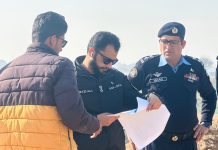ISLAMABAD: An International Conference on ‘Significance of Regional Connectivity for Shared Prosperity: Opportunities and Prospects’ was organized by Center for Global & Strategic Studies (CGSS), here this Thursday. The aim of the Conference was to highlight the importance of regional integration between countries vis-Ã -vis socio-economic and cultural cooperation. Bahria University, Islamabad and Midas (Pvt) Limited were the collaborative partners for this Conference.
The Conference was well attended by the worthy Ambassadors of various countries to Pakistan and subject experts from Pakistan as well.

The Conference commenced by the remarks of Mr. Khalid Taimur Akram, Executive Director, Center for Global & Strategic Studies (CGSS), Islamabad who explained the concept of the Conference. He discussed the significance of Central and South Asia connectivity. He stated that our aim is of connectivity with Eurasia and ASEAN countries. He thanked the worthy Ambassadors and the students of Bahria University for their contributions.
Prof. Dr. Adam Saud, Dean, Faculty of Humanities and Social Sciences, Bahria University, Islamabad in his welcome remarks stated that regional connectivity is one of the most important themes and it is the future of the world. The future belongs to this region i.e., Asia and regional connectivity will bring development and prosperity for the whole region.
Mr. Ashfaq Ahmed Gondal, Former Federal Secretary of Information and Vice-President (Federal Region), CGSS in his opening remarks stated that connectivity and interdependence leads to independence of nations. Connectivity is the key and without that the regional issues cannot be resolved. Connectivity is important for peace and prosperity.
The Conference commenced with the speech of H.E Atadjan Movlamov, Ambassador of Turkmenistan to Pakistan (Dean of Diplomatic Corps) who discussed Turkmenistan’s neutrality policy which is a roadmap for the regional peace & progress. He stated that Turkmenistan is an active member of international community and pays special attention to sustainable development. Turkmenistan is cooperating to combat global challenges. Turkmenistan focuses on development of energy sector for future development, energy security, consumption and transportation is basis of Turkmenistan’s energy sector. Turkmenistan does not only propose initiatives but also takes practical steps for their implementation. His Excellency stated that railway links and pipelines are being established to serve connectivity between different regions.
H.E Yerzhan Kistafin, Ambassador of the Republic of Kazakhstan to Pakistan discussed Kazakhstan inclusive foreign policy contours. He stated that connectivity is very important as COVID-19 has affected our economies and regional connectivity is the key to revive our economies and achieve the ultimate goal. Kazakhstan depends on natural resources. Kazakhstan pays special attention to development of communication and transportation routes. Kazakhstan has well developed infrastructure, corridors and railway links. Kazakhstan is willing to provide transit capabilities to Pakistan to enter European and Central Asian markets. Kazakhstan is an attractive country for air corridors development and it is important to develop favorable conditions for foreign investment.
H.E Aybek Arif Usmanov, Ambassador of the Republic of Uzbekistan to Pakistan discussed the role of Uzbekistan in reinvigorating the phenomena of academic cooperation into regionalism. He stated that this era is of understanding and cooperation. The focus of our leaders is on confidence building measures, security and stability for economic integration between regional countries. These initiatives have consequently developed an era of trust and integration. South Asia is the first neighboring region of Central Asia and we all are a part of this development. Pakistan is considered as the main partner of Central Asia and is considered as the main hub to provide access for Central Asia to seaports of Karachi and Gwadar. – PR





